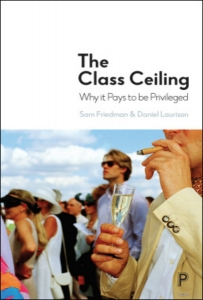In The Class Ceiling: why it pays to be privileged, Sam Friedman and Daniel Laurison offer a unique and encapsulating analysis of class inequality at the top end of the UK labour market. The book is not only compulsory reading for anybody who still believes that the UK is a meritocracy, writes Liam Kennedy, but its mixed-methods approach allows for important, nuanced and often overlooked aspects of social mobility to be understood.
The Class Ceiling: why it pays to be privileged. Sam Friedman and Daniel Laurison. Bristol University Press. 2019.
The utility and prospect of social mobility as a policymaking agenda remain hotly debated. Theresa May has spoken of the importance of the ‘British Dream’ and of ensuring people ‘no matter their class’ have an equal say in society. Yet, little over a year ago, the government’s own Social Mobility Commission resigned over a lack of political action. Going further back still, then Prime Minister Tony Blair had declared the end of class war, and debates have also raged in academia about the declining influence of social class.
In The Class Ceiling: why it pays to be privileged, Sam Friedman and Daniel Laurison put these arguments to bed by rigorously demonstrating the lasting impact that social class has on our career trajectories. Taking advantage of recent amendments to the UK’s largest employment survey and conducting 175 in-depth interviews across four elite occupations, the authors not only expose significant disparities in access to top jobs across social classes but also, and crucially, in those who progress in said jobs. They term this lack of progression as ‘the class ceiling’.
Read full post in the LSE Review of Books blog.


 Find this book:
Find this book: 



Book by Sam Friedman, London School of Economics, The Class ceiling: Why It Pays To BE privileged.
Social mobility, pay gaps, class origin.
For consideration to expand on Report:
Canada’s colour Coded Income Inequality released by CCPa Dec. 19, 2019.
Cheers Rosemary